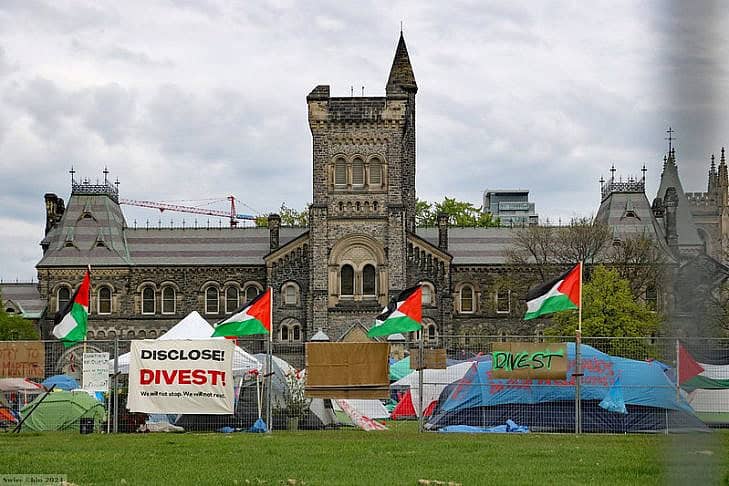Some are looking at the student protests on campus over the war in Gaza with a sense of nostalgia. They have a sense of excitement because they haven’t seen this much student engagement since the Vietnam War, the civil and women’s rights movements and the anti-apartheid movement. They cheer the fact that students are getting engaged. What they may not have noticed or overlooked is the physical attacks against Jewish students.
Consider the following incidents: Jewish students have been physically assaulted, chased and physically prevented from attending classes.
Columbia University (2/2/24): A Jewish Columbia University student was shoved and chased by a group of anti-Israel protesters who noticed the student’s Israeli flag shirt.
University of California, Irvine (4/29/24): At an anti-Israel encampment at UCI, protesters chanted “Intifada” and shoved a Jewish student.
These incidents illustrate a disturbing trend: The line between protesting and harassment is being crossed, and the result is a hostile environment for Jewish students on many campuses.
Student activism has a storied and honored place in American history, from the civil rights movements of the 1960s to the anti-war protests that have shaped public policy and perception. However, the recent surge of hostility directed at Jewish students under the guise of political protest is a serious concern that cannot be ignored.
Protest is a fundamental right in democratic societies, and it serves as a powerful tool for voicing dissent and demanding change. Yet, when protests devolve into acts of intimidation and violence, they lose their moral high ground and pose a threat to the safety and well-being of individuals. The recent attacks on Jewish students are not isolated incidents but part of a troubling pattern that undermines the very principles of free speech and peaceful assembly.
The student’s protests aren’t over policy issues such as Palestinian self-determination or the Boycott, Divestment and Sanctions (BDS) movement. Or the merits of a cease-fire. The assault on Jewish students must be viewed within the broader context of rising anti-Semitism both in the United States and globally. According to the Anti-Defamation League (ADL), antisemitic incidents in the U.S. reached an all-time high in recent years, with a significant increase on college campuses. This surge is not merely a matter of offensive speech; it involves physical assaults, vandalism and direct threats to individuals based on their Jewish identity.
Universities have a responsibility to ensure the safety and inclusion of all students. This includes protecting Jewish students from harassment and violence. Institutions must take proactive measures, such as implementing anti-discrimination policies, providing support services for affected students and fostering a campus climate that condemns bigotry in all forms.
Moreover, student groups and activists must also hold themselves accountable. Advocacy for one cause should not come at the expense of demonizing another group. It is entirely possible to criticize the policies of the Israeli government without resorting to antisemitic rhetoric or actions. Genuine dialogue and peaceful protest can coexist with respect for all individuals’ rights and identities.
The recent incidents are a wakeup call. They demand a reevaluation of how protests are conducted and how dissent is expressed on campus. If left unchecked, this trend of hostility could erode the very foundation of free and open discourse that universities are meant to uphold.
While student engagement in political and social issues is commendable, it must be conducted in a manner that respects the dignity and safety of all community members. The attacks on Jewish students are not merely unfortunate byproducts of passionate activism; they are serious violations that need to be addressed with urgency and resolve. Only by confronting and rectifying these issues can campuses truly be spaces of learning, growth and mutual respect.
This post has been contributed by a third party. The opinions, facts and any media content are presented solely by the author, and JewishBoston assumes no responsibility for them. Want to add your voice to the conversation? Publish your own post here. MORE



